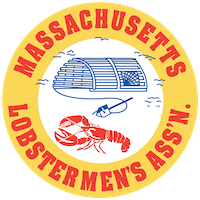Massachusetts Lobstermen's Association
Massachusetts Lobstermen's Association (MLA) is a prominent organization dedicated to supporting the interests of lobster fishermen within the state of Massachusetts. Established with the goal of promoting sustainable lobster fishing practices, advocating for the rights and economic interests of lobstermen, and ensuring the long-term viability of the lobster fishing industry, the MLA plays a crucial role in the state's fishing industry.
History[edit | edit source]
The Massachusetts Lobstermen's Association was founded in [Year], in response to the growing need for a collective voice to represent lobster fishermen in Massachusetts. Since its inception, the MLA has been at the forefront of addressing various challenges faced by the lobster fishing community, including regulatory changes, environmental concerns, and market dynamics.
Objectives[edit | edit source]
The primary objectives of the Massachusetts Lobstermen's Association include:
- Advocating for policies and regulations that support the sustainable management of lobster resources.
- Providing members with up-to-date information on industry developments, scientific research, and changes in regulations.
- Promoting the economic interests of the lobster fishing community in Massachusetts.
- Supporting conservation efforts to ensure the health of marine ecosystems and the long-term viability of lobster populations.
Activities[edit | edit source]
The MLA engages in a wide range of activities to achieve its objectives, including:
- Lobbying at the state and federal levels for favorable policies and regulations.
- Organizing educational workshops and seminars for its members on best practices in lobster fishing and sustainability.
- Collaborating with research institutions and environmental organizations to support scientific research on lobsters and their habitats.
- Participating in public awareness campaigns to highlight the importance of sustainable lobster fishing practices.
Membership[edit | edit source]
Membership in the Massachusetts Lobstermen's Association is open to individuals and businesses involved in the lobster fishing industry, including fishermen, dealers, and processors. Members benefit from the MLA's advocacy efforts, access to industry information, and opportunities for networking and professional development.
Challenges[edit | edit source]
The lobster fishing industry in Massachusetts, like elsewhere, faces several challenges, including fluctuating lobster populations, changing ocean conditions due to climate change, and increasing regulatory requirements. The MLA is actively involved in addressing these challenges through its advocacy and conservation efforts.
Impact[edit | edit source]
The efforts of the Massachusetts Lobstermen's Association have had a significant impact on the lobster fishing industry in Massachusetts. Through its advocacy, the MLA has contributed to the development of policies that support sustainable fishing practices and the economic well-being of lobster fishermen. Additionally, the association's commitment to conservation and sustainability has helped to promote the long-term health of lobster populations and marine ecosystems.
See Also[edit | edit source]
Search WikiMD
Ad.Tired of being Overweight? Try W8MD's physician weight loss program.
Semaglutide (Ozempic / Wegovy and Tirzepatide (Mounjaro / Zepbound) available.
Advertise on WikiMD
|
WikiMD's Wellness Encyclopedia |
| Let Food Be Thy Medicine Medicine Thy Food - Hippocrates |
Translate this page: - East Asian
中文,
日本,
한국어,
South Asian
हिन्दी,
தமிழ்,
తెలుగు,
Urdu,
ಕನ್ನಡ,
Southeast Asian
Indonesian,
Vietnamese,
Thai,
မြန်မာဘာသာ,
বাংলা
European
español,
Deutsch,
français,
Greek,
português do Brasil,
polski,
română,
русский,
Nederlands,
norsk,
svenska,
suomi,
Italian
Middle Eastern & African
عربى,
Turkish,
Persian,
Hebrew,
Afrikaans,
isiZulu,
Kiswahili,
Other
Bulgarian,
Hungarian,
Czech,
Swedish,
മലയാളം,
मराठी,
ਪੰਜਾਬੀ,
ગુજરાતી,
Portuguese,
Ukrainian
Medical Disclaimer: WikiMD is not a substitute for professional medical advice. The information on WikiMD is provided as an information resource only, may be incorrect, outdated or misleading, and is not to be used or relied on for any diagnostic or treatment purposes. Please consult your health care provider before making any healthcare decisions or for guidance about a specific medical condition. WikiMD expressly disclaims responsibility, and shall have no liability, for any damages, loss, injury, or liability whatsoever suffered as a result of your reliance on the information contained in this site. By visiting this site you agree to the foregoing terms and conditions, which may from time to time be changed or supplemented by WikiMD. If you do not agree to the foregoing terms and conditions, you should not enter or use this site. See full disclaimer.
Credits:Most images are courtesy of Wikimedia commons, and templates Wikipedia, licensed under CC BY SA or similar.
Contributors: Prab R. Tumpati, MD

